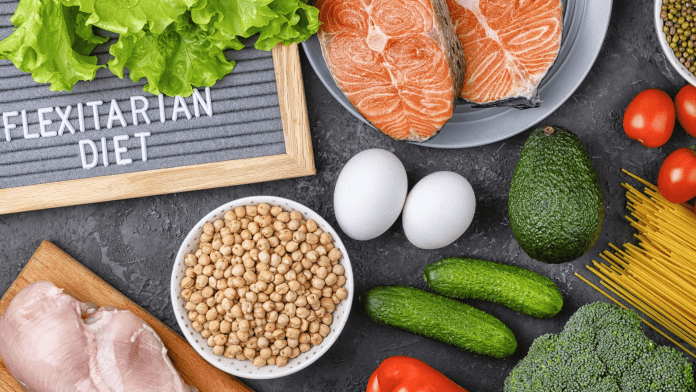In the pursuit of achieving a sculpted and muscular physique, individuals often venture into various diets and workout regimens. Among the multitude of dietary approaches, the Flexitarian Diet has gained popularity for its unique blend of flexibility and health benefits. Unlike strict diets that focus on complete avoidance of certain food groups, the Flexitarian Diet allows for both plant-based and animal-based foods. This article explores how the Flexitarian Diet can be a powerful tool in unlocking muscle gains and leading you on the path to getting shredded in no time.
The Basics of the Flexitarian Diet:
The Flexitarian Diet, a term coined by registered dietitian Dawn Jackson Blatner, combines the words “flexible” and “vegetarian.” It emphasizes predominantly plant-based foods while allowing occasional inclusion of meat and other animal products. The primary focus is on whole, nutrient-dense foods, such as fruits, vegetables, whole grains, legumes, nuts, and seeds. The diet places a significant emphasis on the quality of the food consumed rather than strict calorie counting or macronutrient ratios.
Muscle Gains and the Flexitarian Diet:
One might wonder how a diet predominantly known for its health and environmental benefits can aid in muscle gains. The answer lies in the nutrient-rich nature of the Flexitarian Diet. Plant-based foods offer a diverse range of vitamins, minerals, antioxidants, and phytochemicals that support muscle function and recovery. Additionally, they provide ample amounts of dietary fiber, promoting healthy digestion and nutrient absorption, which is vital for muscle development.
Protein Sources in the Flexitarian Diet:
Protein is an essential macronutrient crucial for muscle growth and repair. Although the Flexitarian Diet reduces meat consumption, it offers various plant-based sources of protein, such as lentils, chickpeas, quinoa, tofu, tempeh, and seitan. These alternatives are packed with protein and contain no cholesterol, making them heart-healthy choices.
Moreover, plant-based protein sources are often lower in calories and saturated fats than their animal-based counterparts, making it easier to maintain a lean body composition while gaining muscle.
Optimizing Nutrient Timing:
To maximize muscle gains, it’s essential to understand the concept of nutrient timing. The Flexitarian Diet allows individuals to plan their meals around their workouts, ensuring that they consume sufficient protein and carbohydrates to support muscle recovery and replenish glycogen stores. Pre-workout meals rich in complex carbohydrates can provide sustained energy during exercise, while post-workout meals with adequate protein aid in muscle repair and growth.
Balancing Macronutrients:
While the Flexitarian Diet is predominantly plant-based, it still permits the inclusion of animal products in moderation. This flexibility allows individuals to balance their macronutrient intake according to their fitness goals. For those aiming to gain muscle mass, increasing protein intake while maintaining an adequate carbohydrate and healthy fat balance is crucial.
Healthy Fats and Muscle Development:
Healthy fats play a significant role in overall health and muscle development. The Flexitarian Diet encourages the consumption of sources like avocados, nuts, seeds, and olive oil, which provide essential fatty acids, supporting hormone production and muscle function. These fats also aid in reducing inflammation, promoting faster recovery from intense workouts.
Micronutrients for Optimal Muscle Function:
Muscle gains go beyond protein intake and macronutrient ratios. Micronutrients, such as magnesium, calcium, iron, zinc, and vitamins like B12 and D, are equally vital for optimal muscle function. The Flexitarian Diet emphasizes nutrient-dense foods, making it easier to meet these essential micronutrient needs.
Nutritional Supplementation for Flexitarians:
While the Flexitarian Diet is nutritionally rich, some individuals might find it challenging to meet certain nutrient requirements solely through food. In such cases, nutritional supplementation can be beneficial. For instance, plant-based athletes may opt for B12 or iron supplements to ensure they maintain healthy levels of these nutrients.
Flexitarianism and Sustainability:
In addition to its muscle-gain benefits, the Flexitarian Diet aligns with sustainable practices and environmental consciousness. By reducing meat consumption and favoring plant-based options, individuals contribute positively to the planet while nourishing their bodies.
Combining the Flexitarian Diet with an Effective Exercise Regimen:
To get shredded in no time, a well-rounded fitness routine is vital. Combining the Flexitarian Diet with a well-designed exercise regimen that includes strength training, cardiovascular exercises, and sufficient rest periods will enhance muscle development and overall fitness.
Final Thoughts:
The Flexitarian Diet, with its focus on plant-based nutrition while allowing moderate consumption of animal products, offers a unique approach to unlocking muscle gains and getting shredded. The diet’s nutrient-rich nature provides the necessary elements for muscle development and recovery, while its flexibility accommodates individual preferences and fitness goals. Combined with a comprehensive exercise routine, the Flexitarian Diet can lead you on a journey towards achieving your desired physique and embracing a sustainable and health-conscious lifestyle. Remember to consult with a registered dietitian or healthcare professional before making any significant dietary changes to ensure it suits your personal needs and health status.





